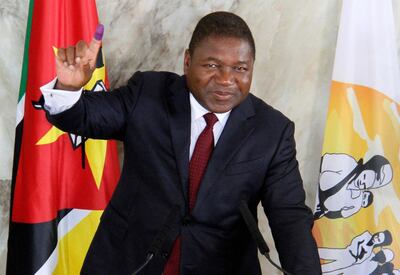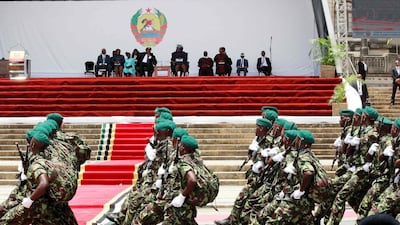Mozambique is losing its battle against Islamist insurgents. Last week, the United Nations declared that armed militants have carried out no less than 28 attacks since the beginning of 2020. It is a notable uptick in violent activity since attacks first began in the country’s northern Cabo Delgado province in late 2017.
Sadistic raids on villages are now commonplace, driving more than 100,000 people from their homes. As Andrej Mahecic, spokesman for the UN High Commissioner for Human Rights noted on February 7, “They speak of men in particular being targeted and beheaded, and many, many reports of women and children ... being kidnapped or simply disappearing."
For Maputo, Mozambique’s capital, the timing could not be worse. In recent years, the country has successfully courted oil majors like Total and ExxonMobil to pump billions of dollars into its promising offshore energy sector. Indeed, ExxonMobil’s joint $30 billion liquefied natural gas project with Italian giant Eni in Mozambique’s Rovuma Basin is set to be by far the largest investment by an American company in Africa for many years to come. The burgeoning energy sector could be a massive boon for Mozambique’s impoverished economy, which was devastated by a decades-long brutal civil war following independence from Portugal in 1975.
Yet the offshore energy sector’s uncomfortably close proximity to areas under militant attack has ratcheted up fears for these oil majors. In fact, reports surfaced in early February that Total and ExxonMobil demanded Maputo send additional security to protect their assets. Mozambican defence minister Jaime Neto has given assurances that the government “is doing everything so that these multinational [firms], including their workers, can operate with tranquillity and security.”
Nevertheless, despite the government’s ongoing efforts, the insurgency shows no signs of waning. Instead, Mozambique’s political class and military are woefully unprepared to deal with a problem of this magnitude. For one, the country’s security forces must grapple with the tyranny of distance, as Maputo to Palma – the base of the growing LNG sector in the far north – is over 2,700km, representing a significant logistical challenge for the largely underfunded and poorly-trained Mozambican military.
In truth, much of the conflict can be laid at the feet of Maputo. Decades of alienation from the more prosperous south have increased resentment in Cabo Delgado province, where Palma is located. Largely undeveloped, the province became the near-exclusive property of predatory local political and economic elites who pilfered government resources meant to improve education and infrastructure. In addition to rampant corruption, security forces in the area are notorious for their heavy-handed responses. Consistent reporting suggests that mass arrests, disappearances and possible torture are not uncommon and have escalated in lock-step with militancy.

Moreover, journalists have been largely prohibited from traveling to the area, both as a reaction to the rising danger and because Maputo seeks to strictly control the flow of damaging information. Nevertheless, this has made it difficult to ascertain the exact nature of the conflict between the insurgents and their enemies. Many details about the insurgents, including their leadership structure and aims, remain shrouded in mystery. And the response from the government of President Felipe Nyusi, who actually hails from Cabo Delgado, has not been promising. Maputo’s rhetoric has focused on labelling insurgents as bandits or manipulative thieves rather than focus on the rampant corruption and other drivers of the conflict.
Most inconvenient for Maputo is the widespread sense that its efforts to clamp down on the spiralling militancy will fail. Even the introduction of Russian private military contractors – two of whom were killed in November – has done little to stem the tide of bloodshed.
Mozambique’s struggle with its northern insurgents will prove to be a cautionary tale for oil and gas majors and natural resource ministries alike.
There are several reasons for this. First, those energy companies that try to ensure sound corporate social responsibility practices – such as fair compensation and building new housing for people displaced by their projects – cannot be sure that the government will follow through on its own part in these efforts. Instead, evidence in Cabo Delgado suggests that surging local anger was the product of a belief that traditional land and fishing areas had been stolen and polluted for the benefit of corrupt elites and foreign interests, indicating that ExxonMobil and its counterparts are on the losing end of a public relations battle despite their efforts to offset the social costs of their projects.
Second, the introduction of more security forces is unlikely to solve the crisis. At most, it will help to temporarily protect energy installations, but will do nothing more to improve the underlying situation. Again, this is because poorly-trained and abusive troops act rather as forces of insecurity, furthering alienation and anger among the victims of their cruelties.
For governments and private companies elsewhere who invest in energy projects beyond their own borders, the lessons of Mozambique are worth noting. No amount of intervention by foreign or local powers and security forces can make up for the severe governance gaps that corrupt and incompetent host governments foster. Instead, outside parties risk being party to heavy-handed tactics that only fuel more violence.
Maputo is out of its depth and simply reacting, with no clear strategy to the crisis on its hands. For their part, interested parties like oil majors and foreign governments must push Maputo to take a hard look at addressing the drivers fundamental to the conflict. Until then, the situation will only worsen, until all of the country’s promising energy potential fades for good.
Stephen Rakowski is a sub-Saharan Africa analyst focused on security, political and economic trends across the continent

